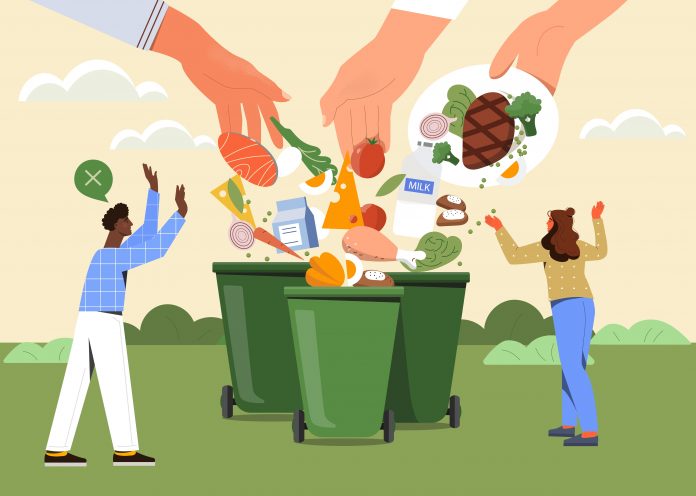The 2023 Fight Food Waste Research Impact Conference was held in Sydney last week (22-23 November).
Hosted by the newly branded End Food Waste Australia (a strategic rebrand bringing Fight 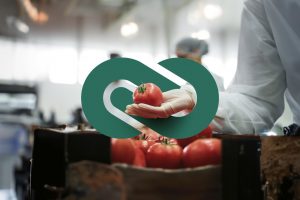 Food Waste Cooperative Research Centre and Stop Food Waste Australia together), the conference shared the organisation’s latest from its Reduce, Transform, and Engage research programs.
Food Waste Cooperative Research Centre and Stop Food Waste Australia together), the conference shared the organisation’s latest from its Reduce, Transform, and Engage research programs.
Project leaders, participants and industry experts spoke about their research findings, experiences and challenges, and discussed future research needs to achieve Australia’s goal of halving food waste by 2030.
In her opening address, Foodbank Australia CEO Brianna Casey acknowledged the attention food waste now receives.
“The fact that we talk about Australia’s $36 billion food waste problem … It’s actually owning the problem,” she said. “That’s a really important step forward and it’s a really important celebration [that’s often forgotten] … 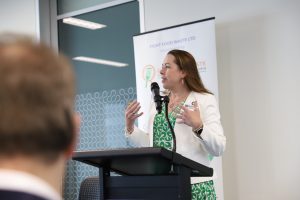
“The fact that we talk everyday about reducing food waste, the fact that people celebrate compost in their backyard, the fact that we talk about worm farms … That’s recognition of the work we do together.”
To this, Ms Casey added that with consumers wanting industry to do more about food waste, it’s “something we need to own and talk about over the next two days”.
“Because if you are here from industry, I’m here to tell you, consumers expect and want more, and they deserve it,” she continued.
“If you’re not part of the industry pact, if you’re not part of this industry program … Talk to us about how you can be, because there’s no better way to put your credentials front and centre. Tell consumers that you’re in this with them; that what they’re doing in the home matters but what you do along the supply chain matters as well.”
Leaf protein
Among the conference’s sessions was a presentation discussing Leaf Protein Co’s efforts extracting leaf protein from the waste of Perfection Fresh’s broccolini. 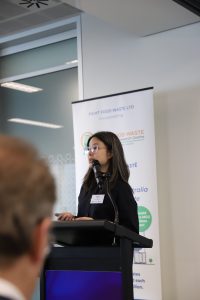
Leaf Protein Co’s mission, explained co-founder and CEO Fern Ho, is to help food manufacturers make better processed foods using “superior” ingredients that it “unlock[s] from earth’s most abundant source of protein, which is leaves”.
She noted that to have that “beautiful bunch” of broccolini consumers expect at the supermarket, there’s “quite a bit of waste that comes out”, including leafy material. After some investigation and R&D, Leaf Protein Co measured around 44% protein in those leaves, which Ms Ho said is a “huge amount”. In comparison, she said beef generally contains around 28% protein.
Perfection Fresh Chief Technical & Sustainability Officer Andrew Redman said the opportunity to provide a new product stream for the company’s farmers is a “really exciting thing”.
“We’ve seen a lot of prototypes come out and I think we’re at the point now where we’re starting to talk about some potential commercial opportunities,” he said.
Australian Food Pact
End Food Waste Australia Head of Australian Food Pact Sam Oakden provided attendees with an update on the Australian Food Pact. 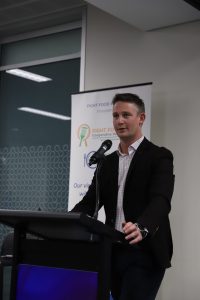
“The Australian Food Pact has been running for two years. We have 32 signatories, [and] that is faster growing than any other voluntary agreement in the world,” he said.
“We have, collectively … in two years, donated 171 million meals [and] have saved 238,000 tonnes of greenhouse gas emissions…”
Citing Australian Food Pact research that surveyed its signatories, Mr Oakden said an organisation with a written food waste action plan has three times less food waste than those organisations without one.
“It’s probably not surprising, but when you put some framework, responsibility and accountability in place, things start to happen within that corporate environment,” he said.
Thesis presentations 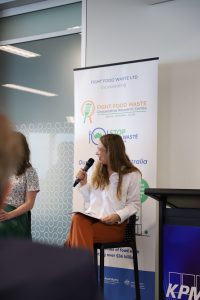
Attendees also heard from students who provided brief overviews of their food waste-related theses.
Talking on her PhD students, End Food Waste Australia Transform Program Leader Francesca Goodman-Smith said: “They put so much work into their topics and they’re really driving change in terms of creating the knowledge base we need to know how to transport food waste into new products.”



